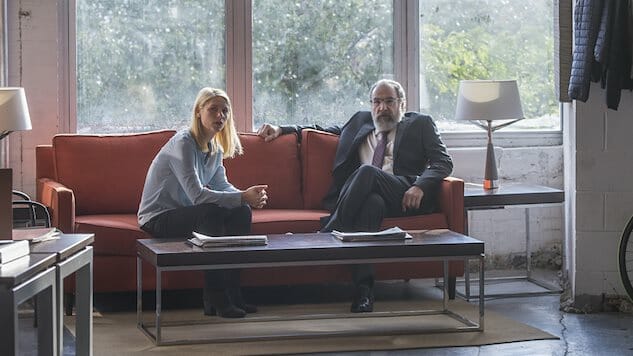Homeland: A Day in the Life of Carrie Mathison
(Episode 6.02)
JoJo Whilden/SHOWTIME
“How was your day?” Quinn (Rupert Friend) asks near the end of “The Man in the Basement,” as Homeland caps off a politically astute hour with a moment of emotional resonance.
“It started with someone throwing a coffee mug at me and went downhill from there,” Carrie (Claire Danes) replies. “How was yours?”
That “someone,” of course, is Quinn, and that day is the episode’s sole focus: An emblem, as I noted with regard to “Fair Game,” of the series’ pared-down structure. From the morning routine—getting her daughter off to school—and the “babysitter”—not for her daughter but for Quinn—to a surreptitious meeting in a New York park, “A Man in the Basement” might more aptly be titled “A Day in the Life of Carrie Mathison,” and without fanfare it elaborates a portrait of a woman pulled in a million directions. It also launches Homeland’s most explicit criticism of the War on Terror to date, as seen, for the first time this season, in the series’ ever-evolving title sequence: Images of the post-9/11 police state set to Gil Scott-Heron’s memorable claim that “the first revolution is when you change your mind about how you look at things.”
One need not ignore Homeland’s ideological shortcomings, not least its occasional lapses into Islamophobia, to suggest that the series has registered increasing skepticism of American policies in recent seasons, and the rather chilling choral rendition of “The Star-Spangled Banner” at the start of the opening credits signals the unease to come. There’s the FBI’s use of a confidential informant, Tyrone Banks, Jr., to entrap Sekou (J. Mallory McCree) with a $5,000 “loan”—which transforms his anti-American online presence into “material support for terrorism.” There’s Reda’s (Patrick Sabongui) censure of Carrie after she describes Sekou’s situation as “unfair”—when the problem runs far deeper than that, and the best Sekou can hope for is a plea bargain. Most scathing of all, there’s the revelation that Dar Adal’s (F. Murray Abraham) story about the fellowship of 9/11, about pulling people off the street and out of the choking cloud of debris, is fiction—exactly the sort of tall tale the United States uses to justify omnipresent surveillance, illegal detentions, and endless wars. (Trump advisor Kellyanne Conway might call this “alternative patriotism.”)
Unsurprisingly, Dar continues to press his hawkish point of view, referring to President-elect Elizabeth Keane (Elizabeth Marvel) as a “novice”: “Presidents don’t get chances, they get tested,” he adds unhelpfully. But Carrie and Saul (Mandy Patinkin), always the axis around which Homeland spins, seem doubtful of Dar’s plan to involve the CIA in a Mossad operation targeting Iran’s shadow nuclear weapons program. It’s not exactly a “new paradigm,” as Carrie terms it—in fact, she lies to Saul’s face when he confronts her about advising Keane—but the pair’s relative reticence points to declining confidence in the present one, echoed by the victorious Keane’s own caution. When Carrie steps out on a limb in “The Man in the Basement,” after all, it’s not to oversee the CIA/Mossad mission (she recommends Saul), but to protect her client, Sekou. “You weren’t going to tell us, were you?” she asks Banks’ FBI handler, Ray Conlin (Dominic Fumusa), before defying the court’s order and contacting Banks. “That this big threat to national security was another Muslim kid you entrapped?”
In this, Homeland establishes the terms of the season—Saul, Carrie, and the president-elect allied, broadly speaking, against the U.S. intelligence and law enforcement communities—but it’s Quinn’s ongoing struggle that begins to explain why our heroine herself has withdrawn her consent for the war we’re in. (In this sense, Dar, the failed war’s fiercest defender, is right: “She’s a menace,” he says to Saul. “Carrie is.”) Quinn, listening to Alex Jones-style conspiracy theories on the radio, eating tinned food and refusing his medication, is a shell of his already haunted self; his seizure in the bodega, augured by flashes of electric color and trouble forming words, only confirms his belief that he’s become “a fucking mutant.” The video of his sarin poisoning, like his terrible question—Why did you save me?—is a reminder of the consequences of our recklessness: The first option is death, the other despair. It sets Carrie crying, Danes’ lip trembling in inimitable fashion, but its implications for the fruitlessness of the conflict itself reminded me of an earlier exchange.
“Why not take a shower?” Max (Maury Sterling), Quinn’s minder, asks, catching a whiff of his former colleague’s smell.
The man in the basement has a simple answer: “Just get dirty again.”
Matt Brennan is the TV editor of Paste Magazine. He tweets about what he’s watching @thefilmgoer.







































